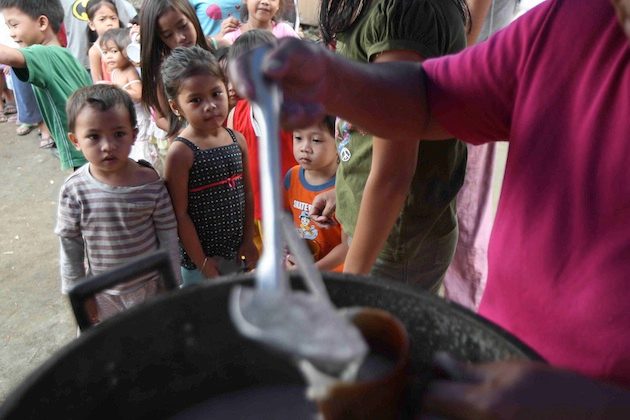SUMMARY
This is AI generated summarization, which may have errors. For context, always refer to the full article.

MANILA, Philippines – When it comes to the effects of climate change, the most vulnerable are the ones living in poverty – the hungry.
The 2014 State of the Food Insecurity report indicates that at least 805 million of the world’s hungry people reside in areas prone to climate hazards.
Unfortunately, these areas are incapable of coping with the consequences of climate change. Mostly labeled as developing countries, they have a long way to go before they can fully achieve climate change adaptation.
Because of this, each devastating natural disaster pushes people into the poverty trap, leading to hunger and malnutrition.
More hungry people
The effects of the changing climate don’t end with weather disturbances.
More than the seemingly “temporary” outputs of extreme weather conditions the world experiences – dry land and floods, among others – lies a bigger problem that may inflict damage to generations to come: food insecurity. (READ: Food security amid a changing climate)
Climate change threatens food security by destroying the already depleting resources of developing countries. It disproportionately impacts the poor who have no means of getting back on their feet as much as adapting to the changes.
When a natural disaster strikes a country with little resources, it can immediately result to food crisis and a widespread malnutrition.
The latest data show that there are at least a billion hungry people in the world. According to a World Food Programme (WFP) report, the lack of effort in making everyone climate resilient may increase this number by 20% in 2050 and will result to a 500-calorie reduction in each person’s consumption.
More than 10 million children will be at risk of malnutrition in less than half a century if this continues. This cycle of poverty and malnutrition will not end and the complications will become intergenerational. (READ: Ending the malnutrition cycle)
Beyond rainy and hot days
The Inter-governmental Panel on Climate Change (IPCC) says that in addition to intensified natural disasters and change in rainfall patterns, climate change will lead to declining water quality and possible contamination of water supplies and agricultural lands.
For Asia, it is expected that climate change will diminish crop yields by up to 50% for wheat and 17% for rice. This will affect over a billion people living in the region.
An April 2014 United Nations (UN) report indicates that crops and aquatic resources will bear the “most devastating impact” of climate change.
Meanwhile, the diminishing the quality of fertile lands of the Philippines will further impale farmers who are already the poorest sector in the country. (READ: Empowering farmers against climate change)
The Philippines is currently 7th among nations that suffer the most from climate change, according to the 2014 Global Climate Risk Index.
Typhoon Ruby had inflicted an estimated damage of P1.9 billion ($44.77 million*) on the agriculture sector when it hit the country in early December, based on Department of Agriculture figures.
This would likely lead to a smaller yield and profit for the farmer and may increase food prices. (READ: How can government lower food prices in the Philippines?)
In the end, the burden lies on the shoulders of those who are not living on enough sustenance – the poor and the hungry – as they are the ones who have no power to adjust to the effects of climate change.
Policies directed to the changing climate should then aspire to address these problems to ensure equality and better welfare to those in need. – Rappler.com
*$1 = P44.4
How else can we help fight hunger? Send your stories and ideas to move.ph@rappler.com. Be part of the solution, be part of the #HungerProject.
Add a comment
How does this make you feel?
There are no comments yet. Add your comment to start the conversation.